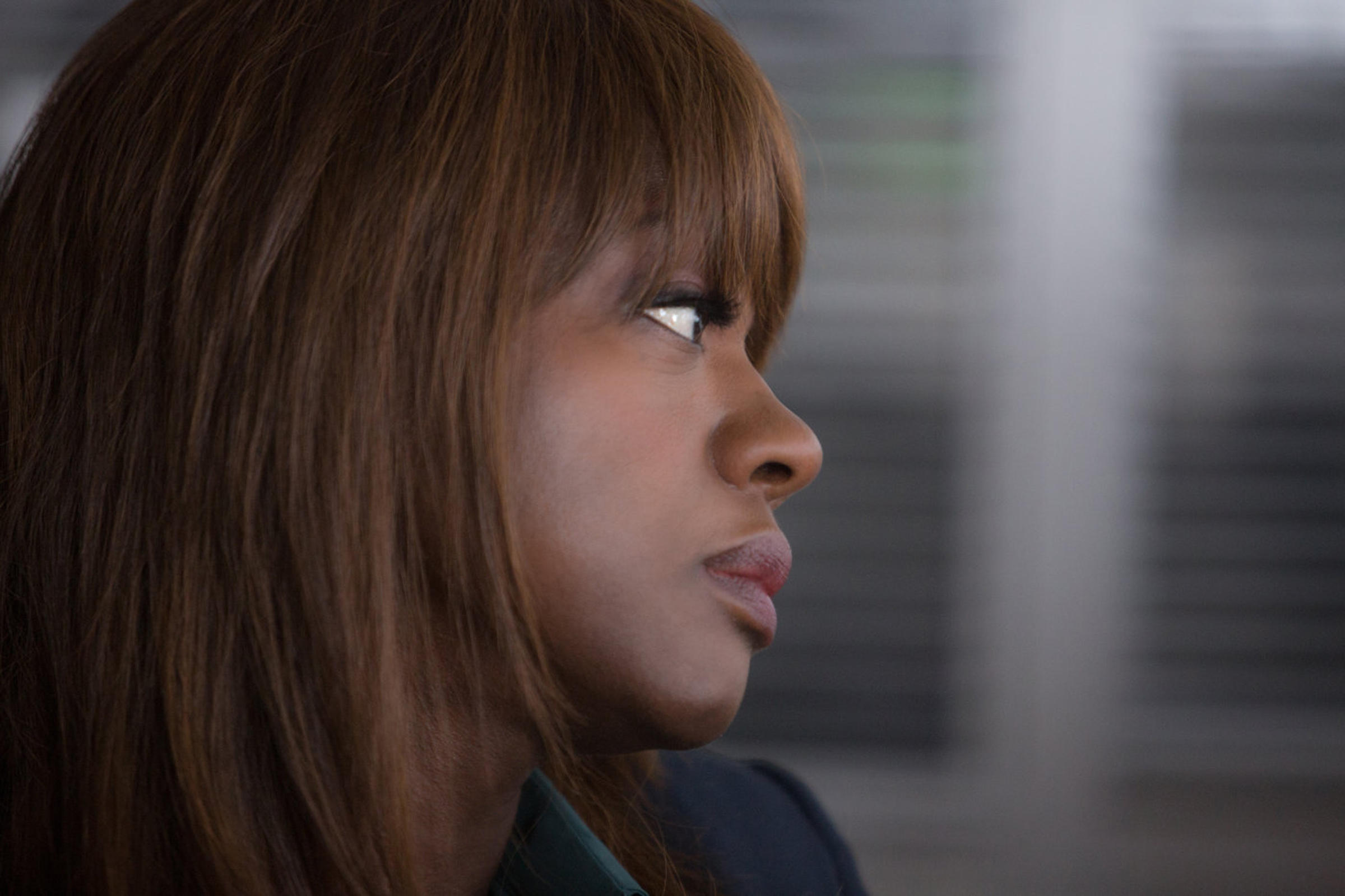Viola Davis is one of the most enthralling actresses of this or any generation
She's so much better than Suicide Squad


A free daily email with the biggest news stories of the day – and the best features from TheWeek.com
You are now subscribed
Your newsletter sign-up was successful
Earlier this year, I sat in front of Michael Mann at the New York premiere of his director's cut of Blackhat, a sublime cyber-thriller that no one saw during its brief theatrical run in 2015. (It cost Legendary Pictures $90 million, and, like a world-class hacker, disappeared silently nearly as soon as it arrived.) Two-thirds of the way through the film, at the moment some people might refer to as the end of the second act if Mann still crafted films that followed film school-approved classic narrative structure, Viola Davis dies dramatically, gunned down by a terrorist-hacker's heavily-armed henchmen. It's an abrupt, jarring death. Each gunshot slams into her with palpable weight, throwing her backwards to the asphalt. She never gets a shot off. She lays supine on the street, staring at the bruise-colored nighttime sky, her wide, unflinching eye framed against a background of smeared skyscrapers.
At this moment, Mann kicked the back of my seat in a fit of madcap laughter.
It makes me wonder if Mann gets perverse enjoyment knowing his masterpiece got ignored like a vital email in a sea of spam. Blackhat bombed so hard at the domestic box office that it was yanked from all but 236 theaters after just three weeks, while America was flocking in droves to see American Sniper. The problem with Blackhat, and I say "problem" with scare quotes, since this isn't a problem at all, is that it lacks "humanity." Mann has no interest in fleshed-out people. Characters are ciphers. The movie is about the pervasiveness of technology, the facelessness with which the internet renders everyone and how a cascade of 1s and 0s has made the world at once tiny yet barren. It is, to date, maybe the only movie that makes staring at a computer screen exciting (we're talking about you, Jason Bourne).
The Week
Escape your echo chamber. Get the facts behind the news, plus analysis from multiple perspectives.

Sign up for The Week's Free Newsletters
From our morning news briefing to a weekly Good News Newsletter, get the best of The Week delivered directly to your inbox.
From our morning news briefing to a weekly Good News Newsletter, get the best of The Week delivered directly to your inbox.
None of this stopped Viola Davis from giving one of the best performances of 2015 — a performance few people saw.
Davis is one of the most enthralling actresses of this or any generation. She'll probably walk away from the next Oscars with a trophy for Denzel Washington's directorial debut Fences, the tremendously hyped August Wilson adaptation that's produced by Scott Rudin, penned by Tony Kushner, starring an all-black cast, and gunning for every Oscar possible. She also stars in this summer's Suicide Squad, a movie that won't win any Oscars, and which is slated to make approximately 30 times what Blackhat made because it features superheroes.
In Blackhat, Davis plays Special Agent Barrett, tasked with babysitting Chris Hemsworth's inexplicably buff computer hacker as he tries to track down a terrorist wreaking havoc on stock market prices and blowing up nuclear reactors. (In the theatrical cut, he does two-and-a-half pushups in jail; in the director's cut, Mann doesn't even pretend to peddle in such trivial explanations.) Hemsworth is comically miscast, though his presence is probably the only thing that got the unmarketable movie funding. Davis' role isn't exactly deep, but she mines the emotional depths of each scene, each sentence, excavating the unpurgeable ghosts that still haunt her after 9/11. Few actresses can say as much with a blank-faced stare as Davis.
In a way, Davis' role in Suicide Squad, as the manipulative, stoically ball-busting Amanda Waller, who wrangles together the gaggle of villains and speaks through electronic devices and computer screens, is a foil to her role in Blackhat, and a fitting emblem for everything the actress brings to each role. (Conan aptly noted that she's the scariest character in the film, which includes a crocodile man, a gross Latino stereotype, and Joel Kinnaman playing Joel Kinnaman.) Davis has an innate intensity to her, something she draws up from some unfathomable mine that must make poor Jared Leto cry at night while he cuddles his inexplicable Oscar. But she doesn't steal scenes with histrionics. When she's having a shouting match with a delirious George Clooney in Solaris, she matches Clooney instead of overpowering him. When she's comforting Jessica Chastain's grieving mother in The Disappearance of Eleanor Rigby, she provides stability to a film that desperately needs it. She knows what a role needs, and what the movie needs from it. She never seems to be waltzing in from another movie.
A free daily email with the biggest news stories of the day – and the best features from TheWeek.com
In Doubt, the performance that catapulted her to A-list status, she goes one-on-one with The Meryl Streep. It's her only scene, but it provides the film with an emotional, philosophical root note around which the rest of the narrative coils. As a mother who knows deeper, darker truths than Streep's stubborn nun, Davis looks exhausted, her coat the color of the dead leaves surrounding them, her face weighed down by the amassment of life. In The Help, Davis' hard stare gives that flaccid, flabby weeper much-needed spine. She plays a woman who needs to keep her eyes perpetually open, a woman who can't afford to misstep or misspeak. In a movie that can most generously be described as "nice," she goes for cruel truths.
Davis may also be the best one-liner-dropping actress currently working. There's a scene in Blackhat when Barrett is talking to a guy named Gary. It doesn't matter who Gary is, or what he does, or why she's talking to him. What matters is the relish with which she chews on every word, cogitating on how to best spit shade at this shaggy-suited corporate husk. She wants to see his data. ("Data" sounds legit.) He tells Barrett she can't see his data until she comes up "with something a little more tangible." She retorts:
"Gary. May I call you Gary? How's this for tangible? In the next 15 seconds I call Laura Greer at the Commodities Trading Commission. And I say, 'Laura, how you doing? I'd like to launch an official investigation on one Gary Baker.' So the headline, 'M-Tech Official Investigation for Aiding and Abetting Cyber Criminals,' leaks to CNN in the next 90, so it makes the three o'clock news cycle, as well as the nightly news. That'd be good, too."
With eyes that burn, she delivers her killing blow: "Am I being tangible?" Beat. "Gary?"
He gives her the data.
What makes this scene, and the entire performance, memorable is how effortlessly Davis throws shade, how she articulates words as if talking to a stupid child for added insult. It won't be remembered as one of her defining film moments, but it offers a succinct look at what makes Davis beguiling. A lot of reviews claimed Davis gives a non-performance, or shambles like some sort of a somnambulist through the movie. But this is a woman chasing after the ghosts of dead loved ones, faced with the possible reality of "another 9/11." When her life expires and she lays in the street, looking up, she sees a building protruding from the skyline, beaming blue, stretching up into the night. It dissipates to black. She looks almost at peace. Maybe her character wasn't so empty after all.
Greg Cwik is a writer and editor. His work appears at Vulture, Playboy, Entertainment Weekly, The Believer, The AV Club, and other good places.
-
 Why is the Trump administration talking about ‘Western civilization’?
Why is the Trump administration talking about ‘Western civilization’?Talking Points Rubio says Europe, US bonded by religion and ancestry
-
 Quentin Deranque: a student’s death energizes the French far right
Quentin Deranque: a student’s death energizes the French far rightIN THE SPOTLIGHT Reactions to the violent killing of an ultraconservative activist offer a glimpse at the culture wars roiling France ahead of next year’s elections
-
 Secured vs. unsecured loans: how do they differ and which is better?
Secured vs. unsecured loans: how do they differ and which is better?the explainer They are distinguished by the level of risk and the inclusion of collateral
